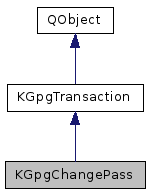kgpg
#include <kgpgchangepass.h>

Public Member Functions | |
| KGpgChangePass (QObject *parent, const QString &keyid) | |
| virtual | ~KGpgChangePass () |
 Public Member Functions inherited from KGpgTransaction Public Member Functions inherited from KGpgTransaction | |
| KGpgTransaction (QObject *parent=0, const bool allowChaining=false) | |
| virtual | ~KGpgTransaction () |
| void | clearInputTransaction () |
| const QString & | getDescription () const |
| bool | hasInputTransaction () const |
| void | kill () |
| void | setGnuPGHome (const QString &home) |
| void | setInputTransaction (KGpgTransaction *ta) |
| void | start () |
| int | waitForFinished (const int msecs=-1) |
Protected Member Functions | |
| virtual bool | nextLine (const QString &line) |
| virtual bool | passphraseReceived () |
| virtual bool | passphraseRequested () |
| virtual bool | preStart () |
 Protected Member Functions inherited from KGpgTransaction Protected Member Functions inherited from KGpgTransaction | |
| int | addArgument (const QString &arg) |
| void | addArgumentRef (int *ref) |
| int | addArguments (const QStringList &args) |
| void | addIdHint (QString txt) |
| void | askNewPassphrase (const QString &text) |
| bool | askPassphrase (const QString &message=QString()) |
| virtual ts_boolanswer | boolQuestion (const QString &line) |
| virtual ts_boolanswer | confirmOverwrite (KUrl ¤tFile) |
| virtual void | finish () |
| QString | getIdHints () const |
| GPGProc * | getProcess () |
| int | getSuccess () const |
| virtual bool | hintLine (const ts_hintType hint, const QString &args) |
| void | insertArgument (const int pos, const QString &arg) |
| void | insertArguments (const int pos, const QStringList &args) |
| virtual void | newPassphraseEntered () |
| virtual void | postStart () |
| void | replaceArgument (const int pos, const QString &arg) |
| void | setDescription (const QString &description) |
| void | setSuccess (const int v) |
| void | unexpectedLine (const QString &line) |
| void | waitForInputTransaction () |
| void | write (const QByteArray &a, const bool lf=true) |
| void | write (const int i) |
Additional Inherited Members | |
 Public Types inherited from KGpgTransaction Public Types inherited from KGpgTransaction | |
| enum | ts_boolanswer { BA_UNKNOWN = 0, BA_YES = 1, BA_NO = 2 } |
| enum | ts_hintType { HT_KEYEXPIRED = 0, HT_SIGEXPIRED = 1, HT_NOSECKEY = 2, HT_ENCTO = 3 } |
| enum | ts_transaction { TS_OK = 0, TS_BAD_PASSPHRASE = 1, TS_MSG_SEQUENCE = 2, TS_USER_ABORTED = 3, TS_INVALID_EMAIL = 4, TS_INPUT_PROCESS_ERROR = 5, TS_COMMON_END = 100 } |
 Signals inherited from KGpgTransaction Signals inherited from KGpgTransaction | |
| void | done (int result) |
| void | infoProgress (qulonglong processedAmount, qulonglong totalAmount) |
| void | statusMessage (const QString &msg) |
Detailed Description
set a new passphrase for a key pair
Definition at line 24 of file kgpgchangepass.h.
Constructor & Destructor Documentation
| KGpgChangePass::KGpgChangePass | ( | QObject * | parent, |
| const QString & | keyid | ||
| ) |
Definition at line 18 of file kgpgchangepass.cpp.
|
virtual |
Definition at line 29 of file kgpgchangepass.cpp.
Member Function Documentation
|
protectedvirtual |
Called for every line the gpg process writes.
- Parameters
-
line the input from the process
- Returns
- true if "quit" should be sent to process
You need to implement this member to get a usable subclass.
When this function returns true "quit" is written to the process.
Implements KGpgTransaction.
Definition at line 42 of file kgpgchangepass.cpp.
|
protectedvirtual |
called when GnuPG accepted the passphrase
- Returns
- if the input channel to GnuPG should be closed
- Return values
-
true close the input channel of the GnuPG process false keep the GnuPG input channel open
This allows a transaction to handle passphrase success in a special way. The default implementation will just return true.
Reimplemented from KGpgTransaction.
Definition at line 78 of file kgpgchangepass.cpp.
|
protectedvirtual |
called when GnuPG asks for a passphrase
- Returns
- if the processing should continue
- Return values
-
true processing should continue false an error occurred, transaction should be aborted
This allows a transaction to implement special handling for passphrases, e.g. when both old and new passphrase must be requested when changing it. The default implementation will just call askPassphrase().
Reimplemented from KGpgTransaction.
Definition at line 64 of file kgpgchangepass.cpp.
|
protectedvirtual |
Called before the gpg process is started.
- Returns
- true if the process should be started
You may reimplement this member if you need to do some special operations before the process is started. The command line of the process may be modified for the last time here.
When you notice that some values passed are invalid or the transaction does not need to be run for some other reason you should call setSuccess() to set the return value and return false. In this case the process is not started but the value is immediately returned.
Reimplemented from KGpgTransaction.
Definition at line 34 of file kgpgchangepass.cpp.
The documentation for this class was generated from the following files:
Documentation copyright © 1996-2014 The KDE developers.
Generated on Tue Oct 14 2014 23:07:52 by doxygen 1.8.7 written by Dimitri van Heesch, © 1997-2006
KDE's Doxygen guidelines are available online.
 KDE API Reference
KDE API Reference